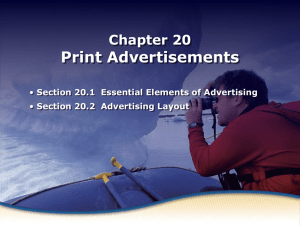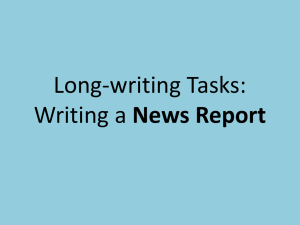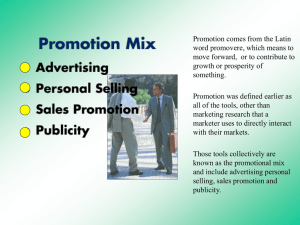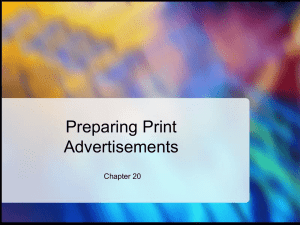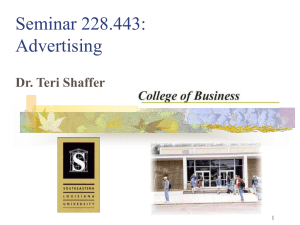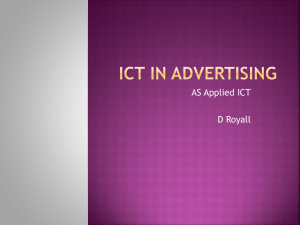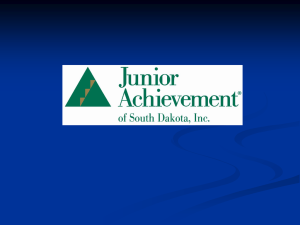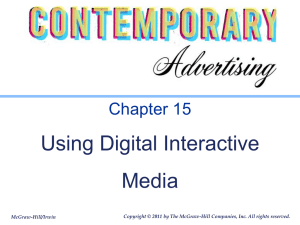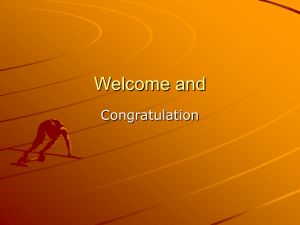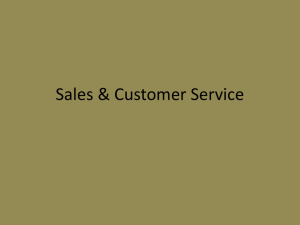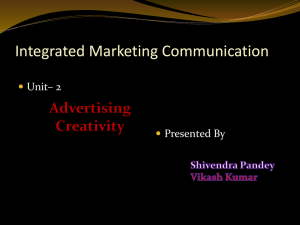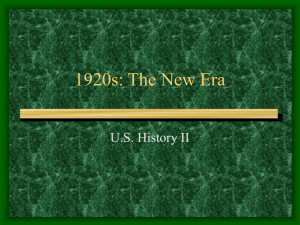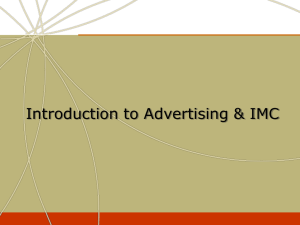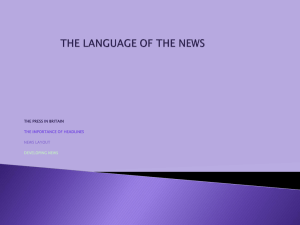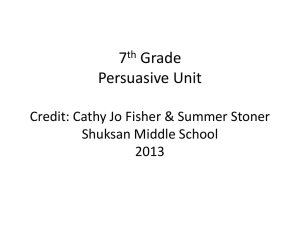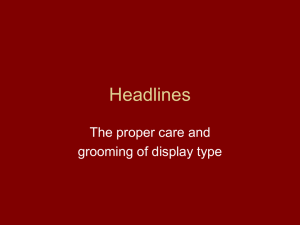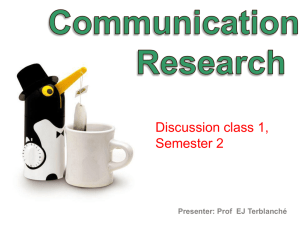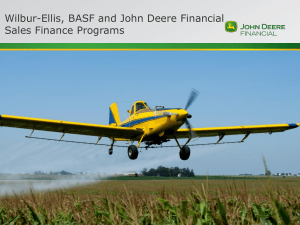Preparing Print Advertisements
advertisement
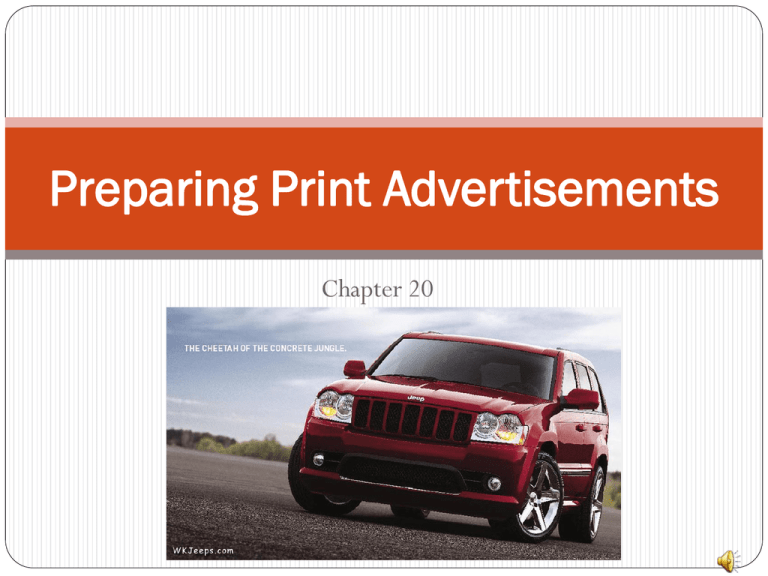
Preparing Print Advertisements Chapter 20 Objectives 1. 2. 3. 4. 5. 6. Identify the elements of a print advertisement. Describe how ads are developed Create advertising headlines Prepare advertising copy Select advertising illustrations Explain the significance of a signature Vocabulary Advertising campaign Advertising agencies Headline Copy Illustration Clip art Signature Slogan The Advertising Campaign A group of advertisements, commercials, and related promotional materials and activities that are designed as part of a coordinated advertising plan to meet the specific goals of a company. An integrated advertising campaign involves the creation and coordination of a series of advertisements around a particular theme. Steps to plan an integrated advertising campaign: 1. Identify the target audience 2. Determine objectives 3. Establish the budget 4. Develop the message 5. Select the media 6. Evaluate the campaign The Advertising Agency Companies that exist solely to help clients sell their products. There are about 10,000 such agencies in the United States, employing 100,000 people. Most are located in New York City, Chicago, and Los Angeles. Leo Burnett—Chicago, IL Private Company Incorporated: 1935 Employees: 6,950 Billings: $5.4 billion worldwide (1996) 58,703,886 (2010) The Advertising Agency Advertising Agencies are independent businesses that specialize in developing ad campaigns and crafting the ads for clients. Full-service agencies plan the entire advertising campaign by: Setting objectives Developing advertising messages and strategies Completing media plans Selecting media Coordinating related activities Including sales promotion and public relations Advertising Agencies Larger advertising agencies employ specialists such as: Copywriters Graphic artists Media experts Marketing researchers Legal advisors Limited-service agencies specialize in one aspect of the campaign. Developing Print Advertisements Print advertisements must contain certain essential elements: 1. Headline 2. Copy 3. Illustrations 4. Signature *Some advertisements also include slogans 1. Headline 3. Illustration 2. Copy 4. Signature 5. Slogan Developing Print Advertisements To communicate successfully and ad must: Attract attention Arouse interest Each of an ads key parts must Create desire be coordinated with the others Produce action Headline The phrase, sentence, lettering, slogan, or saying that attracts the readers’ attention, arouses their interest, and leads them to read the rest of the ad for a particular product or service. Responsible for 70% to 80% of the sales’ effectiveness. Must be attention getters, or the advertisement may not be read. Slogans Techniques Alliteration—Repeating initial consonant sounds Ruffles have ridges Paradox—a seeming contradiction that could be true It will fill you up, but it won’t weigh you down. Rhyme Bounty…The Quicker Thicker Picker Upper Slogan Techniques Pun—a humorous use of a word that suggests two or more of its meaning or the meaning of another word similar in sound Every Litter Bit Hurts Play on words For Soft Babies and Baby Soft Hands Slogan Examples Need Help with a Slogan? www.sloganmaker.com Sublines Clarify or expand on the main idea expressed in the headline. Usually found in smaller type close to the headline Examples: PRIDE AND JOY Introducing Kids of Color from Playskool 13 Hour Sale Hudson’s Great Savings Storewide! Attention Getters New Product Coming Soon! OPEN HOUSE Book Signing Event Headline Facts More than 80% of the people who look at print advertisements just read the headlines. You need to create a powerful headline! Powerful Headlines Single focus, or main idea. Before writing the headline, try to sum up the main idea in a single sentence. This technique will help you remain focused on the subject and thus produce a headline with impact. 2. Use one or more of the 3 most powerful words – new, now, and free! 1. FREE Powerful Headlines Headlines should be directed to the reader and appeal to the selfinterest of the potential customer. 2. Make your headline long enough to include one product feature. 3. Arouse the readers’ curiosity by promising something—a free offer, more miles per gallon, better service, etc. 4. Use simple language and everyone will understand your message. 1. Copy The copy is the selling message in a written advertisement. Expand on the information in the headline or product shown in the illustration. Simple and direct Vary from a few words to several paragraphs Get the message across. Appeal to the senses— customer should see, hear, touch, taste and/or even smell a product Copy Techniques Establish contact with the reader Create awareness Arouse interest Build preference for the product Give your copy news value by providing specific information Tell the who, what, when, why, where, and how of your product. Facts about your product are more powerful than claims. Use histories, statistics, performance figures, dates, and quotes from experts Copy Key Words Compare Introducing Now Price Save Easy New Establish immediate contact with the reader Copy Action Words Today Act Now Before it’s too late Without delay Illustration Photograph or Drawing Primary functions are: Attract attention Arouse desire to buy Encourage a purchase decision for the advertised product Should tie into the headline and copy Should lead the potential customer to read at least the first sentence of the copy. Illustration (Photograph, Drawing, Clip Art) Usually the first thing a reader sees in the ad. Illustrations should show: 1. The features of the product 2. How the product works 3. The advantages of owning the product 4. The safety features of the product 5. The possible uses for the product 6. The need for the product 7. The image associated with the product, such as prestige, status, or leisure Photographs Ideal when a sense of reality is necessary. Clothing, cosmetics, jewelry, furniture, or stereos. Drawings Show a part of a product that the reader would not normally see. Cutaway drawing of such products as cars, equipment, and tools. Clip Art Stock drawings, photographs, headlines clipped from a printed sheet and pasted onto an advertisement. Inexpensive, quick, and easy to use Signature (logo) The sponsor completes the ad. Distinctive identification symbol for a business. Name of the firm Address Telephone number Internet Address Business hours Slogan (catch phrase, small group of words) A well designed signature gets instant recognition for a business. Should be easy to remember Advertising Elements 1. Headline 2. Illustration 3. Copy 4. Signature Hurry! Cell Phone This phone is the best. It has all the latest features. • Feature •Feature •Feature Get yours now! Best Cell Phone International
